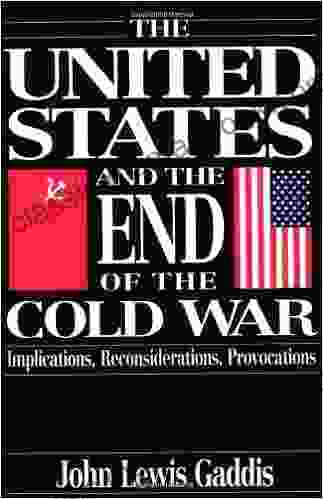The United States and the End of the Cold War: A Comprehensive Analysis

5 out of 5
| Language | : | English |
| File size | : | 5252 KB |
| Text-to-Speech | : | Enabled |
| Screen Reader | : | Supported |
| Word Wise | : | Enabled |
| Print length | : | 318 pages |
| Lending | : | Enabled |
The Cold War, a period of intense geopolitical tension between the United States and the Soviet Union that lasted for nearly half a century, came to an end in the late 1980s and early 1990s. The collapse of the Soviet Union, the dissolution of the Eastern Bloc, and the reunification of Germany marked a watershed moment in world history, signifying the end of an era characterized by nuclear brinkmanship and ideological rivalry. The United States, as the dominant superpower during this period, played a pivotal role in shaping the course of events that led to the end of the Cold War.
Political Factors
The United States adopted a hardline stance towards the Soviet Union under President Ronald Reagan, who famously declared the Soviet Union an "evil empire." Reagan's administration increased military spending, accelerated the development of new weapons systems, and pursued a policy of containment to prevent the spread of communism. Additionally, Reagan's support for anti-communist movements in Afghanistan, Central America, and Eastern Europe helped to weaken the Soviet Union's global influence.
Meanwhile, the Soviet Union under Mikhail Gorbachev embarked on a series of reforms known as perestroika and glasnost. Perestroika aimed to restructure the Soviet economy, while glasnost promoted greater openness and transparency in Soviet society. These reforms, intended to revitalize the Soviet Union, inadvertently accelerated its decline by exposing the deep-seated problems within its political and economic systems.
Economic Factors
The Soviet Union's economy was plagued by inefficiency, stagnation, and a lack of innovation. The country's central planning system failed to meet the needs of the Soviet people, leading to shortages of consumer goods and a decline in living standards. The Soviet government's heavy military spending further strained the economy.
In contrast, the United States enjoyed a period of economic prosperity during the 1980s. The Reagan administration's policies of deregulation and tax cuts stimulated economic growth and created jobs. The United States' strong economy provided a stark contrast to the struggling Soviet economy, further undermining the Soviet Union's legitimacy.
Military Factors
The United States and the Soviet Union engaged in a costly arms race throughout the Cold War. The development and deployment of nuclear weapons and delivery systems created a precarious balance of terror that threatened the survival of both countries. However, the United States' technological superiority in areas such as satellite reconnaissance and missile defense gave it an advantage over the Soviet Union.
The United States' military presence in Europe and its close ties to NATO allies played a significant role in deterring Soviet aggression. The Soviet Union's inability to match the United States' military capabilities, coupled with its economic problems, made it increasingly difficult to sustain its superpower status.
The end of the Cold War was a complex process influenced by a multitude of factors. The United States' hardline stance, the Soviet Union's internal problems, the arms race, and the economic disparities between the two superpowers all contributed to the collapse of the Soviet Union. The United States, as the dominant superpower during this period, played a pivotal role in shaping the course of events that led to the end of the Cold War. The subsequent emergence of a unipolar world order with the United States as the sole superpower has had a profound impact on global affairs, and its consequences continue to shape the world today.
5 out of 5
| Language | : | English |
| File size | : | 5252 KB |
| Text-to-Speech | : | Enabled |
| Screen Reader | : | Supported |
| Word Wise | : | Enabled |
| Print length | : | 318 pages |
| Lending | : | Enabled |
Do you want to contribute by writing guest posts on this blog?
Please contact us and send us a resume of previous articles that you have written.
 Top Book
Top Book Novel
Novel Fiction
Fiction Nonfiction
Nonfiction Literature
Literature Paperback
Paperback Hardcover
Hardcover E-book
E-book Audiobook
Audiobook Bestseller
Bestseller Classic
Classic Mystery
Mystery Thriller
Thriller Romance
Romance Fantasy
Fantasy Science Fiction
Science Fiction Biography
Biography Memoir
Memoir Autobiography
Autobiography Poetry
Poetry Drama
Drama Historical Fiction
Historical Fiction Self-help
Self-help Young Adult
Young Adult Childrens Books
Childrens Books Graphic Novel
Graphic Novel Anthology
Anthology Series
Series Encyclopedia
Encyclopedia Reference
Reference Guidebook
Guidebook Textbook
Textbook Workbook
Workbook Journal
Journal Diary
Diary Manuscript
Manuscript Folio
Folio Pulp Fiction
Pulp Fiction Short Stories
Short Stories Fairy Tales
Fairy Tales Fables
Fables Mythology
Mythology Philosophy
Philosophy Religion
Religion Spirituality
Spirituality Essays
Essays Critique
Critique Commentary
Commentary Glossary
Glossary Bibliography
Bibliography Index
Index Table of Contents
Table of Contents Preface
Preface Introduction
Introduction Foreword
Foreword Afterword
Afterword Appendices
Appendices Annotations
Annotations Footnotes
Footnotes Epilogue
Epilogue Prologue
Prologue Sean Coons
Sean Coons Ron Marz
Ron Marz Freida Mcfadden
Freida Mcfadden Sarah Hoss
Sarah Hoss Rudolf Mauz
Rudolf Mauz T Heather Herdman
T Heather Herdman Leslie Wolfe
Leslie Wolfe Christopher Kennedy
Christopher Kennedy Ross Silke
Ross Silke Haylie Pomroy
Haylie Pomroy M Ruth Myers
M Ruth Myers Liz Kohler Brown
Liz Kohler Brown Lara Mimosa Montes
Lara Mimosa Montes Kenneth Rexroth
Kenneth Rexroth Archie Goodwin
Archie Goodwin Marv Wolfman
Marv Wolfman Vidyan Ravinthiran
Vidyan Ravinthiran Mauro Entrialgo
Mauro Entrialgo James Pierson Beckwourth
James Pierson Beckwourth Daniel Hall
Daniel Hall
Light bulbAdvertise smarter! Our strategic ad space ensures maximum exposure. Reserve your spot today!

 Leslie CarterThe Enigmatic Lady in the Red Dress: Unveiling the Mystery Behind a Timeless...
Leslie CarterThe Enigmatic Lady in the Red Dress: Unveiling the Mystery Behind a Timeless...
 Federico García LorcaThe Politics of American Education: Sociocultural, Political, and Historical...
Federico García LorcaThe Politics of American Education: Sociocultural, Political, and Historical...
 Dwayne MitchellDive into the Heart-Pounding Suspense of "Hellfire": A Riveting Hawk Tate...
Dwayne MitchellDive into the Heart-Pounding Suspense of "Hellfire": A Riveting Hawk Tate... Gil TurnerFollow ·12.9k
Gil TurnerFollow ·12.9k Ernest ClineFollow ·10.3k
Ernest ClineFollow ·10.3k Arthur Conan DoyleFollow ·17.4k
Arthur Conan DoyleFollow ·17.4k Vincent MitchellFollow ·14.1k
Vincent MitchellFollow ·14.1k Larry ReedFollow ·3.8k
Larry ReedFollow ·3.8k Floyd PowellFollow ·18.8k
Floyd PowellFollow ·18.8k Samuel BeckettFollow ·8.6k
Samuel BeckettFollow ·8.6k Gus HayesFollow ·18.7k
Gus HayesFollow ·18.7k

 Bryan Gray
Bryan GrayCello Alternativo: Exploring Contemporary Pizzicato...
: Embracing the Avant-Garde Within...

 Victor Hugo
Victor HugoThe Social Revolution: Barry Libert's Vision for a More...
In a world where...

 Tony Carter
Tony CarterA Comprehensive Guide to Crafting Clear and Effective Job...
A job description is a critical tool...

 Deacon Bell
Deacon BellSelected Poems And Prose Lorenzo Da Ponte Italian Library
Lorenzo Da Ponte, born...

 Francisco Cox
Francisco CoxWhat You Need To Know About Opportunity Cost: A...
Opportunity cost is a fundamental concept...

 Bill Grant
Bill GrantWhy Our Kids With Behavioral Challenges Are Falling...
Every year,...
5 out of 5
| Language | : | English |
| File size | : | 5252 KB |
| Text-to-Speech | : | Enabled |
| Screen Reader | : | Supported |
| Word Wise | : | Enabled |
| Print length | : | 318 pages |
| Lending | : | Enabled |






